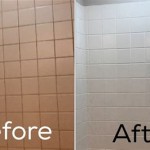Transitioning Between Ceramic Tile and Laminate Floor: An Essential Guide
When it comes to flooring, ceramic tile and laminate are two popular materials that offer distinct properties and aesthetics. However, transitioning between these two surfaces can be a challenge, especially if you're seeking a seamless and visually appealing result.
In this guide, we'll delve into the essential aspects of transitioning between ceramic tile and laminate flooring, providing you with expert insights to achieve a professional-looking and durable finish.
Determining the Transition Type
The type of transition you choose will depend on the specific requirements of your space and the aesthetic you wish to achieve. Here are the two main options:
- T-Molding: T-molding is a metal or plastic strip that fits over the joint between the two surfaces, creating a raised edge. It's a classic and effective solution for transitioning between different heights, such as when ceramic tile is raised above laminate flooring.
- Reducer: A reducer is a similar metal or plastic strip, but it slopes down from the higher surface to the lower surface. It's commonly used when transitioning from laminate flooring to ceramic tile that is at a lower level.
Choosing the Right Materials
The material you select for your transition should complement the existing flooring and décor. Metal transitions are durable and available in various finishes, including brass, aluminum, and stainless steel. Plastic transitions are typically more affordable and come in a range of colors.
It's important to consider the width of the transition as well. Wider transitions can create a more prominent divide between the two surfaces, while narrower transitions can blend more seamlessly.
Preparing the Subfloor
Properly preparing the subfloor is crucial for a successful transition. Ensure that the subfloor is level and free of any irregularities or debris. If there are any height differences between the two surfaces, you may need to use a leveling compound to smooth them out.
Installing the Transition
Installing the transition is relatively straightforward, but it requires precision to achieve a clean and secure joint. Follow these steps:
- Measure and cut the transition to the required length.
- Apply a thin layer of construction adhesive to the underside of the transition.
- Position the transition over the joint between the two surfaces and press it into place.
- Secure the transition further by tapping it gently with a hammer or rubber mallet.
- Wipe away any excess adhesive and allow it to dry completely.
Finishing Touches
To complete the transition, you can add a touch of caulk along the edges to seal any gaps and ensure a waterproof finish. Choose a caulk color that matches the transition or the flooring for a cohesive look.
With careful planning and execution, you can create a seamless and aesthetically pleasing transition between ceramic tile and laminate flooring. By following these essential aspects, you'll achieve a professional-quality finish that will enhance the beauty and functionality of your space.

Guide To Flooring Transition Strips Nufloors

Guide To Flooring Transition Strips Nufloors

Tile Transition Strips How To Handle Flooring Transitions

How To Install A Transition Strip On Floor

Your Guide To Stunning Floor Transitions Next Day Floors

How To Transition Between 2 Diffe Types Of Flooring

Tile Transition To Laminate Wood Grain Flooring

Tile To Wood Floor Transition Ideas 11 Clever Ways Atlas Ceramics

Transition Entre Deux Planchers Vinyle Bois Et Ceramique

How To Install Flat Transitions Between Laminate Flooring And Tile Tips Mryoucandoityourself
Related Posts








